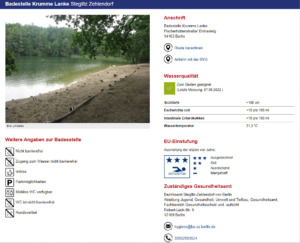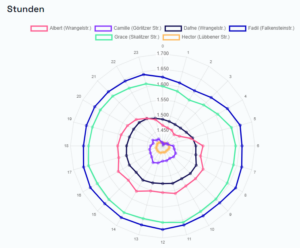Finding data treasures: On data availability and data use in our society - and what is still possible here
We all make decisions every day. In companies and politics, there is often a demand for these decisions to be made based on data in order to capture reality as well as possible and select targeted measures based on this.
Data from which information for decisions can be derived is therefore needed for every conceivable question. In addition, almost everyone uses (digital) services that are based on data. But where does this data come from? Sure, you can collect it yourself. However, this can be anything from very time-consuming to impossible for individuals. You can also use existing (e.g. public) data that has been provided by others. We know this from our customers and have already described it in blog posts: Someone has to make it available first.
Data-driven means change - for companies and society
In companies, initiatives in line with the strategy ensure that they become "data driven". We know from experience that this is a long road. Especially when it comes to sensitizing people to the change that creates an awareness of the value of data and has the use and sharing of data as its basis and consequence.
And now let's imagine that we want to promote this change not only among employees of a company, but also among "society" or the many employees of public administration at all levels and in all areas. The basic understanding of what can be done with data, as well as the presentation and reading of dashboards, has received a boost in recent years, especially due to the pandemic. However, transferring this to your own sphere of influence does not always work. How can an understanding be created and strengthened that data that is already available is also made available to other users, thus generating ideas on how data can be used in a socially useful way?
Data availability using the example of public administrations
As citizens, we generally have little contact with data from the public administration. Yet the large volumes of available data contain a great deal of information for a wide range of issues. In turn, administrations often lack the know-how and awareness of what potential (data) treasure is being guarded and how this can be made accessible to the public or other administrative areas. This can either be done between administrations at a detailed level with the citizen's permission. The advantage for the citizen is that he or she does not have to transmit data that has already been transmitted a second time. Or data at an aggregated level, which can also be useful outside the administration because it can provide a wide range of information, e.g. on population structure, mobility or infrastructure.
One large-scale attempt to lay a foundation for the use of administrative data is the Open Data Strategy adopted by the Federal Cabinet in 2021. This stipulates that publicly collected data that is not personal and does not contain security-relevant information should be shared as a matter of principle.
The aim is to make the state a pioneer in achieving data-driven economic growth, contributing to civil society and ecological initiatives and enabling efficiency gains in public administration. Although the latter in particular is aimed at internal administrative processes, it can significantly change citizens' points of contact with the administration. Until now, data has had to be collected at various points or transferred at great expense.
Administrative data can also be an important source of information for the development of new business models. The added value from the services can support both economic growth and initiatives.
Data availability and data use: promotion is needed here
In addition to various measures to promote the supply of data, such as the operation of a platform for the central provision of data, measures to promote the use of data are also important. This is done, for example, by presenting services. One example is Open Data Berlin. The information center of the state of Berlin is intended to support employees of the administration in sharing data and thus lay the foundation for possible digital services. Funding is also available from various bodies for the use of data.
One example is the overview of Berlin's bathing areas. What is special here is that, in addition to the data that is already openly accessible, further data from the public health department and the water companies has been added - something that has rarely happened before. The information page for the public is the result of a project that was intended to model the bathing water quality on a daily basis using the weather, among other things, instead of just measuring the quality on site every two weeks. The modeling project was based on the experience that certain bathing areas are particularly affected by pollution after (heavy) rainfall. This information from the models was not only made available to the administration, but also to the public in a clear form.

When providing data, there are also applications that rely on citizens as data providers in addition to the public administration. One example involves sensor data, e.g. for measuring the volume in a narrowly defined neighborhood and with time dependencies.
In addition to strategic noise maps with public data, this can provide a more detailed picture depending on the time of day or specific local conditions. The figure shows a noise map over the course of the day according to the measurements at the various private measuring stations.

Now, this presentation of private sensor data is an example with very few sensors at present. However, the important thing is to offer a portal through which a wide audience can share their own sensor data and make a data-driven statement together with the sensor data of others. This will gradually strengthen the data culture among the population.
Data availability in mobility projects
In Baden-Württemberg, the Ministry of Transport is active in the field of data collection and provision. Even if it is not widely advertised, MobiData BW is at least a household name for those interested and has already received numerous awards. This is mobility data that is also used in (mobility) apps.
Anyone involved with mobility data may have already heard of the Mobility Data Space. At its core, this has a similar idea to MobiData BW or other "open data initiatives". Due to the participation of large corporations from the automotive industry and public transport, the players are heavyweight. There has been massive support from ministries, and the federal states are also involved as shareholders. However, the large companies involved will have significant pressure to make the data usable. The resulting services will then come from the manufacturers to us customers. These customers will not know that the service was made possible by the large-scale sharing of data in a portal. For the companies involved, however, synergies can be leveraged through the use of data in (digital) business models, making some complex data collection and provision for other services possible in the first place.
For the awareness of a "data-driven society", it is important to hear what is possible with shared data. This is done by talking about it and presenting services. Looking at the GovData portal, there are a number of Berlin projects in the showroom, as well as projects from individual cities.
There are also digital offerings in BW, especially for administrative processes in line with the digitalization strategy. Unfortunately, it is not possible to find a hall of fame of what is possible from the masses of data available in administrations. That is a great pity! Not least because the projects were often funded with a lot of taxpayers' money. The example of Berlin's bathing areas shows that it was only possible to make the results of the statistical modeling project, which was also funded by the state, available to everyone on a daily basis by providing the digital service.
A basic understanding of the sharing and use of data is not self-evident and is also very unevenly distributed across society. However, it is not unchangeable. A public administration needs support in the use and sharing of data, just like employees in companies. If society or even employees in a company know what to do with the dashboards and services, then it will become increasingly common to recognize the value of data and thus also increase the willingness to share data. With the appropriate support in the administrations, this can result in a rich supply of data.
Learn more about Machine Larning
Sources:
https://www.govdata.de/
https://berlinopensource.de/projekt/badestellen/
https://stories.stadtpuls.com/wrangelkiez
https://www.mobidata-bw.de/
https://www.mobidata-bw.de/

